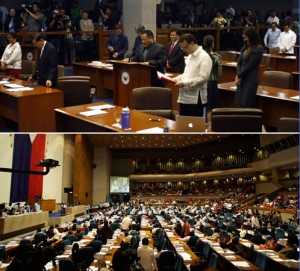Congress members least trusted, says new survey

Members of both Houses of Congress remained the least-trusted government officials in the country, a new survey released this week showed. FILE PHOTOS
MANILA, Philippines–They are supposed to represent the nation’s interests, but members of both Houses of Congress remained the least-trusted government officials in the country, a new survey released this week showed.
Both the Senate and the House of Representatives were the least-trusted institutions in a survey conducted earlier this year. This skepticism toward the legislative branch of government was nearly universal, transcending social status and educational attainment.
The government in general was the least-trusted branch of Philippine society.
On the opposite end of the spectrum, the Church had the rosiest image, earning the trust of most citizens, rich or poor, according to the Philippine Trust Index (PTI) report released on Monday.
The latest report is the third since the PTI project’s launch in 2011.
Article continues after this advertisementAbout 1,600 people were surveyed, with about 1,000 being “ordinary citizens,” or people with no more than two years of college education.
Article continues after this advertisementThe rest were so-called “informed citizens,” most of whom have at least a four-year college degree, according to public relations firm EON, which publishes the PTI report.
The survey was conducted in the second quarter of the year and covered respondents at least 18 years of age.
Trust in the government declined since 2012, the last time the survey was conducted, according to the report.
Among the general public, the government’s trust rating dropped 4 points to 11 percent while the informed public’s trust declined from 14 percent to 7 percent.
Businesses were trusted by 13 percent of the general public and 10 percent by the informed public, while nongovernment organizations had a score of 12 and 9 percent for the general and informed publics, respectively.
Office of the President
Among individual government institutions, the Office of the President fared well, earning the trust of 16 percent of the general population and 15 percent of the informed public.
Both scores were down 12 and 9 percentage points, respectively, but were still comparable to the trust ratings of the Cabinet, local governments and the Supreme Court.
Just 4 percent of the informed public trusted the Senate, while 6 percent of the same group had trust in the House of Representatives.
Among the general public, the Senate was trusted by 7 percent while members of the Lower House had the trust of 9 percent.
Malacañang’s relatively high score compared with other government agencies was reflective of the public’s romanticism with President Aquino’s family and its storied past, said Malou Tiquia of Publicis Asia, a consulting firm.
“People would always say he would do things in accordance with how the parents would have done things,” Tiquia said. “The Philippines is so enamored with the Aquino family.”
Tiquia traced the public’s distrust of Congress to recent issues over the misuse of pork barrel funds, which have led to the arrest of three members of the Senate on plunder charges.
Filipinos still trusted the Church over all other sectors of civil society. Coming in at a far second was the academe, and at third, the media.
In the fourth and fifth places were the business sector and nongovernment institutions, respectively.
Church most trusted
“The Church remains the most trusted institution, showing a significant and steady increase in trust ratings since PTI was launched,” EON said in the report.
Data show the Church is the most trusted among the six institutions surveyed, with 75 percent of the general public and 66 percent of the informed public saying they trust it “very much.”
The survey did not make a distinction among various religious organizations.
The academe follows with 53 percent of the general public and 45 percent of the informed public trusting it very much. Media is the third-most trusted, with 33-percent and 22-percent trust ratings from the general and informed publics, respectively.
TV networks are the most trusted, followed by radio and newspapers, while online sources, despite being widely read, were still less trusted.
“The results show that trust is dynamic and that it can be built and eroded,” Malyn Molina, EON assistant vice president for business development, said in a statement.
“It also highlighted that for Filipinos, trust can break communication barriers and is a tool that grounds relationships, which is why it will always be worthwhile to invest in building trust,” she said.
RELATED STORIES
Despite increase, Congress, SC fail to get majority trust, approval ratings—Pulse Asia